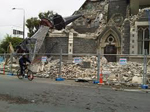
Christchurch's earthquakes have brought the issue of seismic strengthening into the spotlight, and owners around the country are facing million-dollar bills to upgrade their buildings.
But Brian Jones, director of the Hampton Jones building consultancy, says owners should not look to cut corners or do the bare minimum, as building standards may quickly change and public perceptions of what is acceptable may follow.
The Building Act of 2004 requires all buildings to be brought up to 33 per cent of the design level of what a new building must achieve to withstand a moderate earthquake.
Councils around the country have been given the job of identifying buildings that don't meet that standard, and telling owners to upgrade them. But many have been given decades to do the work.
Jones says landlords will be wise to hold off on doing the work for now.
The commission of inquiry looking at the Canterbury earthquake is yet to produce its findings and recommendations, and he suspects that when it does it could prompt more changes to the building code.
Owners who have brought their buildings up to the minimum standard required may find they have to do the work again. "Landlords undertaking strengthening work in the short term may wish to go beyond meeting current minimum strengthening standards, as I believe the building standards will be increased once the review of current standards has been completed," says Jones.
Waiting is the best option, he says, unless an anchor tenant such as a Government department has a lease coming up for review and strengthening work is a condition of it continuing.
Jones says the market also appears to be demanding more strengthening than the law requires.
Many banks are requiring buildings to be up to 80 per cent of the modern standard if they are to occupy them. He says owners may find it hard to sell or let buildings that are perceived to be unsafe.
"The return on investment isn't going to take long when you take into account time when a building is off the market without tenants."
He says once work is started, strengthening beyond the minimum is not much more expensive. He would not put a dollar figure on the extra investment, saying it varied depending on a building's size and construction. Unreinforced masonry buildings are the most expensive to upgrade.
"If you're upgrading a steel frame or concrete frame, the difference between 40 per cent and 70 per cent is not significant compared to all the other costs."
But the Wellington City Council's seismic activity manager, Steve Cody, did not agree with the call to wait.
His council has a deadline of 2014 to complete its round of building assessments, and owners have up to 20 years to do the work.
He says he encourages people to maximise the strength of their buildings and says if people can afford to do it immediately, they should.
He says the projected building boom in Christchurch could make it harder to find people to take on the work in future.
Jones said the strengthening provided an opportunity for the Kiwi construction industry to become world leaders.
He says the research that is happening offers a huge economic growth opportunity for New Zealand and we are likely to become the international leaders in the study and construction of seismic resistant building.
"Our entire country is exposed to seismic and volcanic risk and as we have a large percentage of the population who would be at risk in the event of a significant event. There is a pressing need to continue the research into those areas. We know that it is possible to build buildings that are economically resilient after a seismic event."

![[TMM Podcast] Yelsa serves up “marine reserve” of property buyers](https://www.goodreturns.co.nz/pics/mike%20harvey.jpg)



 Search
Search
